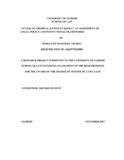| dc.description.abstract | The Constitution of Kenya, 2010 guarantees all persons equal protection of the law. It also demands that “justice must be done to all irrespective of status” and that all state organs must ensure access to justice for all persons and “where any fee is required, it must be reasonable and not impede access to justice.” In addition, the Constitution guarantees fair trial for all persons charged with criminal offences. These constitutional dictates oblige efficient delivery of “substantive justice without undue regard to procedural technicalities.” The courts and other state institutions in the criminal justice system, especially the police, prosecution, witness protection and correctional services have the primary responsibility to deliver this justice to the citizenry without discrimination. It is however acknowledged that the criminal justice system like all other formal justice systems is a complex network. It comprises autonomous but interdependent state agencies involving the police, prosecutors, courts, correctional services and non-state actors among others. This study examined the concept of access to criminal justice as an integral feature in the realization of the “rule of law” and equality of all persons before the law, as embodied not only in international and regional human rights instruments, but also in the Kenya Constitution, 2010. The research proposition is that, a country whose legal framework does not afford its citizens equal access to the criminal justice as measured by its Constitution and international and regional human rights instruments ratified by that country, in effect, occasions them an injustice. The need for an efficient and effective criminal justice system for the citizens and especially the poor, vulnerable and the marginalized is therefore evident in the discussion. The paper scans through the Kenyan Constitutional, legal, policy and institutional frameworks on access to criminal justice by identifying its inadequacies, challenges and prospects in securing access to criminal justice for the citizens. The study acknowledges wide-ranging legislation and on-going institutional reforms in the judiciary, the police, prisons, prosecution, witness protection and non-state actors responsible for the delivery of criminal justice. The contribution of the organized legal profession is also acknowledged and discussed. The objectives of the study were: to identify the factors inhibiting access to criminal justice and to propose ways of addressing these challenges. The study also sought to identify the successes within the system and to highlight the efforts made and being made in addressing the challenges identified. Finally, the results of the study were intended to inspire policy formulation, dialogue and public awareness of the significance of having an effective and efficient criminal justice system in the country. | en_US |



